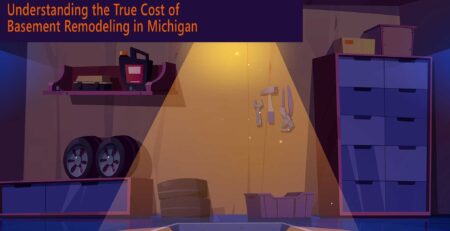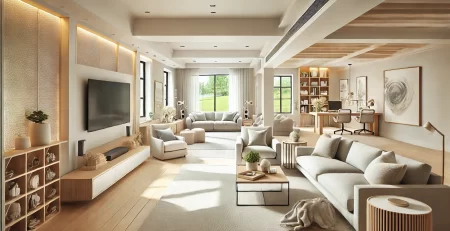Avoid These Costly Mistakes for a Basement Remodel That Boosts Your Home’s Value!
Successful basement remodeling can significantly boost your home’s value and utility, but common missteps can undermine the investment and add costly repairs down the line. Below are expanded strategies to help Michigan homeowners avoid pitfalls, ensuring a remodel that’s both financially rewarding and functional for years to come.
1. Skipping Waterproofing and Moisture Control
Why It Matters:
Basements are inherently prone to moisture issues, especially in Michigan, where the climate includes high humidity and snow, both of which can contribute to water infiltration.
Without waterproofing, your remodeled basement may be susceptible to mold growth, wood rot, and damage to any drywall or finishes, which can compromise the space and lead to costly repairs.
Solution:
Start your project with a comprehensive waterproofing plan. This includes sealing foundation cracks, installing a drainage system, and possibly a sump pump for basements with flooding risks.
Waterproof coatings on floors and walls act as an additional barrier, while vapor barriers under flooring add further protection. Consider insulating with closed-cell spray foam or rigid foam boards, which are more moisture-resistant than fiberglass.
Hiring a waterproofing professional to inspect and reinforce these measures can prevent damage, ensuring your basement remodel remains dry and safe.
2. Neglecting Natural Light and Adequate Lighting
Why It Matters:
A dark basement can feel unwelcoming, small, and even claustrophobic. Natural light brightens the space, making it feel larger and more open, while also adding a psychological boost.
Prospective buyers are more likely to appreciate a basement that feels connected to the main living areas.
Solution:
If the basement is above grade on any side, consider installing egress windows. Not only do they bring in natural light, but they also meet building codes for safety, particularly if you’re creating a bedroom.
Where windows aren’t possible, design a layered lighting plan using recessed lighting for general illumination, wall sconces to soften shadows, and accent lights to highlight specific areas.
LED lighting is a cost-effective and energy-efficient option, and fixtures with dimmer switches allow for versatility depending on how the space is used.
3. Over-Customization and Personalization
Why It Matters:
Personal tastes can limit a home’s appeal to a broad market. Bold, unique designs—such as custom bar areas, niche entertainment spaces, or brightly colored built-ins—may resonate with current owners but could turn off potential buyers who envision a more neutral, adaptable space.
Solution:
Focus on creating a basement that appeals to a wide audience. Use neutral colors for walls and flooring, and avoid permanent features that cater to specific hobbies or tastes.
Modular furniture or freestanding shelves are versatile, allowing future homeowners to adapt the space to their needs.
Opt for classic finishes and materials that have timeless appeal, like light wood tones, neutral paint shades, and durable, easy-to-maintain surfaces.
4. Neglecting Code Compliance and Permits
Why It Matters:
Building codes exist to ensure safety and functionality, and any basement remodel involving structural changes, plumbing, or electrical work will require adherence to local regulations.
Unpermitted work can be flagged during inspections, complicating home sales, and buyers may hesitate to purchase homes with potential compliance issues.
Solution:
Before beginning any work, consult local building authorities to determine which permits are necessary.
If you’re adding a bedroom, you’ll need to meet specific egress requirements to classify it as livable space.
Working with licensed contractors familiar with Michigan building codes can help streamline the permitting process and ensure the remodel is legally sound.
Keeping records of permits and inspections also reassures future buyers that the work was done correctly.
5. Ignoring Insulation and Energy Efficiency
Why It Matters:
Inadequate insulation can make basements cold in the winter and difficult to heat, resulting in higher energy bills and an uncomfortable space.
Michigan’s cold winters make insulation a key component in making a basement usable and comfortable.
Solution:
Invest in high-quality, moisture-resistant insulation materials like closed-cell spray foam or rigid foam board, particularly on exterior walls.
Insulate floors if you plan to use the basement as a living area, which will help reduce heat loss and prevent drafts.
Sealing gaps around windows and doors, and installing energy-efficient fixtures, will reduce energy costs and enhance the basement’s comfort.
Consider adding a separate HVAC zone for the basement to better control temperature and improve overall energy efficiency.
6. Choosing Inappropriate Flooring Materials
Why It Matters:
The flooring you choose for your basement should handle potential moisture while providing comfort and durability.
Traditional materials like hardwood or carpet can be damaged by moisture, leading to warping, mildew, or mold growth, which can add maintenance costs and diminish the remodel’s appeal.
Solution:
Opt for basement-appropriate flooring like luxury vinyl plank (LVP), tile, or epoxy-coated concrete, all of which are resistant to moisture and relatively low-maintenance.
These materials come in various styles that mimic wood or stone, providing a stylish look without the risk.
If you want added warmth, use area rugs that can be removed and cleaned, and choose underlayment that has moisture-resistant properties for comfort and insulation.
7. Underestimating the Importance of Ventilation
Why It Matters:
Poor ventilation can lead to a buildup of humidity and odors, making the basement feel damp and less pleasant.
Over time, inadequate ventilation can lead to moisture problems, which are common in Michigan’s humid summer months, and may also cause health issues related to mold and poor indoor air quality.
Solution:
Ensure that the basement has proper airflow by extending your HVAC system or installing a dedicated ventilation system.
Consider adding ceiling fans, dehumidifiers, or exhaust fans to improve air circulation.
Proper ventilation reduces humidity and enhances the basement’s livability, making it more comfortable and protecting it from mold and mildew.
8. Overlooking the Need for Multi-Functional Space Design
Why It Matters:
A basement remodel with a single purpose, such as a home theater or gym, may not appeal to a wide range of potential buyers.
Michigan homeowners, particularly those with growing families, often seek spaces that can adapt to changing needs, making multi-functional designs more appealing.
Solution:
Design the basement to serve multiple functions by dividing it into zones.
For instance, designate a section as a family entertainment area with comfortable seating and a TV, create a small office nook with a desk and shelving, and set aside an area with workout equipment that can also serve as storage.
This flexible layout can adapt to future needs, ensuring the basement remains useful for a variety of purposes, which enhances both current enjoyment and resale value.
9. Neglecting Adequate Storage Solutions
Why It Matters:
Basements are often used for storage, and a remodel that lacks storage space may lead to clutter or force homeowners to compromise on organization elsewhere. Ample storage is a priority for most buyers, who will appreciate a remodeled basement that accommodates both storage and living needs.
Solution:
Integrate functional storage solutions into the basement design. Built-in shelves, cabinets, or storage closets blend seamlessly with the space, providing ample room for items like seasonal decorations, sports equipment, and tools. Maximize under-stair storage and use multi-functional furniture with hidden compartments for added storage capacity.
Planning for adequate storage not only keeps the basement organized but also enhances its appeal to potential buyers by offering functionality and aesthetic value.
By paying attention to these potential mistakes and planning ahead, Michigan homeowners can ensure a basement remodel that maximizes their home’s value, improves livability, and provides a versatile space for years to come. T
his strategic approach to design and materials will yield a basement that’s both functional and attractive to future buyers, making it a smart long-term investment






Leave a Reply